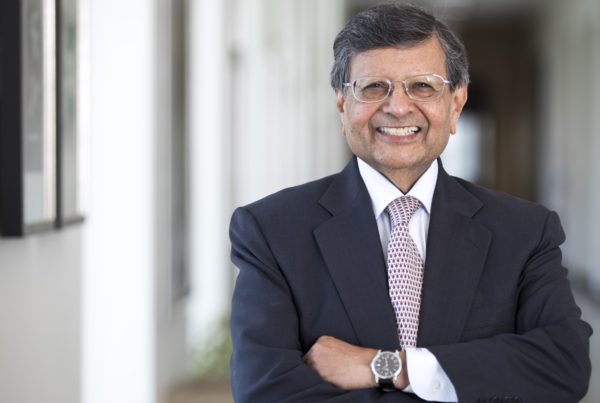Published: January 12, 2005 in Knowledge@Emory
At a rare news conference shortly after the election, America’s first MBA president told reporters that he had “earned capital in the campaign, political capital, and now I intend to spend it.” But as all business students learn in their accounting classes, for every credit there is a debit, and some professors at Emory University and its Goizueta Business School say that the costs incurred in generating that capital – two expensive and unresolved wars, growing federal budget and trade deficits, and deep personal unpopularity on the global stage – may limit how much President George W. Bush will be able to buy with his capital in his second term.
Changes in the tax code are clearly a top item on the Bush agenda. Randall Strahan, a professor of political science at Emory who has a specialty in the study of Congressional politics, says he expects the Bush administration will seek to make the temporary tax cuts of the first term permanent and will likely introduce some major restructuring to the current tax code. Although policymakers have discussed the possibility of radical revisions before, including throwing out the income tax altogether in favor of a value-added tax, Strahan believes a more limited tax code revision akin to former President Ronald Reagan’s 1986 reform is probably more likely.
The crux of the debate, in Strahan’s view, will be over tax progressivity – that is, whether the rich should pay a higher percentage of their income in taxes than the poor and middle class. “I think the whole question of progressivity in the tax code, both in terms of tax cuts and tax reform, will be issues on which the President will probably have to compromise,” Strahan says. (To grossly oversimplify, Republican policy tends to favor lowering tax rates on people with higher taxable incomes, believing that it encourages more investment, while Democratic policy typically believe in higher taxes for people with higher incomes, in the belief that taxes unfairly burden the middle class and poor more than the rich.)
Privatizing a portion of Social Security is also high on the Bush wish list. The popular New Deal-era program is frequently called “the third rail of American politics” – touch it and you’re dead politically- but Emory political observers are convinced that with Republican majorities in the House and Senate the President will have the clout to get some kind of partial privatization measure passed.
But should they? George Benston, a professor of accounting, finance, and economics, notes that privatization would have two positive results. It would create a forced savings plan that would boost America’s extremely low savings rate and, if funded from income or other tax revenues, would reduce the payroll tax, a tax that makes employment more expensive than it otherwise would be. However, a privatized Social Security system would also create several practical problems.
For example, in Chile and other countries where privatized pension programs have been implemented, such programs proved expensive to administer, Benston says. “It turns out that the administrative costs are very high proportionally because you’re talking about relatively small sums of money. It’s just hard to keep all of the records,” he explains. In contrast, the Social Security Administration is very efficient.
It’s also unclear whether the freedom to invest Social Security money in a 401(k) account as frequently envisioned would be a good thing for people, according to Benston. “I have read papers on the subject indicating that– when given a wide range of choices– people tend to make bad choices,” he notes. For example, they often keep their funds in low-return, excessively safe investment (given their age), or risk it all in an undiversified portfolio. Additionally, he points out that bad investment choices made by individuals would lead to another social issue down the line: how would the program deal with the problem of people who invest badly?
But what concerns Benston more is that taking money out of payroll taxes and into savings plans would likely create huge deficits for the current system. Some economists have estimated it could create trillions in new obligations. “If they continue the benefits and collect less of the tax, then there goes the deficit again,” Benston says.
Benston believes that the impetus for Social Security privatization stems in part from a misunderstanding about how the program works.
In reality, there is no special fund allotted for Social Security – the payroll taxes of today’s workers go directly to today’s retirees, he says. Why the misunderstanding? “It’s as if Congress had passed a law that said these are the pensions that will be granted and we’ll put aside a certain amount of the taxes that we collect to pay these, and should we ever run out of the money that we put aside, that’s the end of it. Congress is not putting aside the money, they’re just putting aside a bookkeeping entry that limits the amount that can go into that fund,” he explains. Benston points out that Social Security is really a welfare program that is tied to the beneficiaries’ past wages, and funded with a tax on wages, rather than a tax on incomes generally or a tax on some other source.
Attempts to rein in healthcare costs are likely to be much more modest, Emory scholars say. Kenneth Thorpe, a widely quoted professor in Emory’s School of Public Health and a health cost policy expert, says Bush will probably push for two or three changes, beginning with a damage limitation for medical malpractice claims.
The administration is also likely to try to change current laws so that small businesses will be able to create associations that will enable them to leverage their insurance buying power collectively, Thorpe adds. While the plan could lower costs for small businesses, it’s also likely to run into strong opposition from smaller insurance brokerage companies that would be hurt from such a plan, he says.
Finally, there’s likely to be another push to make medical savings accounts more attractive, Thorpe says. Although touted as a way to cut health care costs generally, Thorpe says that so far such plans, which combine a high-deductible insurance policy with tax-free savings for health insurance expenses, have actually tended to help higher-income people the most. The Administration is expected to introduce a provision to make the insurance portion of the MSA tax-deductible, Thorpe says, in the hope of encouraging wider adoption of the program.
Although the GOP has majorities in both the House and in the Senate, passing all those proposals is likely to prove tougher for the Bush team than one might guess. “There is not what I would call a conservative working majority in the Senate,” Strahan says.
As a result, Strahan believes the Bush team will have to compromise. With Social Security proposals, for example, “it’s probably going to have to negotiate with moderate Republicans and some of the more centrist Democrats in order to get a majority of this through,” he says.
In addition, one factor that may have limiting impact on all these plans is the government debt. Last year alone, the government ran a $477 billion budget deficit. “Unless there is a period — pretty soon — of very, very robust economic growth, the deficit looms large over anything that happens on the domestic side,” observes Strahan. “I think it will tend to constrain either new spending or program changes that lose revenue–such as the restructuring of the Social Security program.”
However, Benston is not so sure that deficits will slow Bush down. Unlike the Democrats, whom Republicans have taunted for their “tax and spend” policies, he says the Republicans prefer to spend and borrow, which turns out to have few short-term political consequences. “People don’t recognize that whatever’s spent now has got to be paid for, and so the constraints on spending get removed,” he says.
The Tax Foundation, a Washington think tank on tax issues, estimates that total spending under Bush have grown by 4.6% annually in his first term, the highest of any president in the past 30 years. Only Jimmy Carter and Ronald Reagan came close – 4.1% for Carter and 3.5% for Reagan in his first term (which shrank to 1.8% in his second term). Defense spending under Bush also grew by 8.2% annually while non-defense discretionary spending grew by 6%. Only in entitlement spending did he fail to break a 30-year record – his 4.8% annual increase was bested by his father’s record of 5%.
To pay for that, the government accumulated an average of $357 billion in debt each year – a record even when his predecessors’ unpaid charges are measured in constant 2004 dollars – the nearest contender being Reagan in his first term, who spent $339 billion a year more than he had.
About the only good fiscal comparison for the President is that spending as a percentage of the gross domestic product is not high compared to those other presidential terms – approximately 3.7% of GDP on average, about 2/3 of Reagan’s first term spending record, which ran to 6.1% of GDP, according to the Tax Foundation.
In 2004, the government spent 7.4% of every dollar it collected on interest, much less than the record 15.2% spent on interest during the first Clinton term. A leaner budget would tend to magnify interest paid on the long-term debt. In addition, the current low interest rates paid on Treasury bonds means that the government’s charge account goes much farther than it used to. In January 1992 when Clinton went into office, the forecast yield on the 10-year Treasury bond stood at 7.03% and fell to 6.63% in January 2000. Today, by comparison, the forecast yield stands at 3.76%, according to Federal Reserve statistics.
One reason for those continued low interest rates has been the need for Japan, China, and India to dispose of the dollars earned in their growing U.S. export trade. As of the second quarter, the difference between what the U.S. bought and what the U.S. sold – the current accounts deficit – stood at $166.2 billion, according to the Bureau of Economic Analysis.
Since the Asian countries don’t want as many U.S. goods and services as the U.S. buys from them, they have instead had to park that money in U.S. Treasury bills.
But debt can’t be a country’s fastest-growing export forever, particularly when that country is already the world’s biggest debtor. In recent weeks, the value of the dollar has slid to new lows against the Euro and the yen – making dollar debt cheaper, but perhaps making the debtors less happy about making more loans. Eventually, some economists fear that these imbalances will force the U.S. to pay other countries more for its debt, raising domestic interest rates and in turn leading to domestic political pressure for more restrictive trade practices.
But some professors say Bush is likely to resist pressure for more protection from foreign competition. When it comes to trade policy, Robert Ahdieh, a professor at Emory’s School of Law and a trade law expert, believes that the Administration may be more committed to free trade this time round than during the first term. In the first term, political expediency sometimes led to protectionist moves on behalf of a number of U.S. industries, such as steel. This term, Ahdieh says, the Administration may revert to the Republican Party’s core belief in free trade.
“I don’t see much of a power base within this administration…for protectionism. The arguments for protectionism come from voices that are primarily oriented to the next election cycle,” Ahdieh says – and such political considerations are less significant now that Bush has no reelection to consider.
However, Ahdieh does see rising trade friction with Europe as inevitable over the next four years. “Overall, the trend can only be toward growing tension between Europe and the United States as Europe increasingly operates like a big country and effective competitor with the United States,” he says. But overall, he expects more attempts on the part of the U.S. to reach compromise with Europe this term than last.
Asian policy may be more problematic. As for China, Ahdieh says,“there is the prospect that domestic political action groups focused on the persecution of Christians in China will demand increased use of economic levers to pressure the Chinese to improve their human rights record.” It’s not easy to imagine this strategy bearing fruit, Ahdieh notes, given how important China is to the growth prospects of many U.S. businesses, but it is possible.
Yet as important as economics are likely to be, Strahan believes that the Administration’s attention will be focused more on war and political foreign policy. “Obviously, the challenge for the second term is primarily Iraq,” he says. “I think [other issues] are important to the Administration, but I think their focus is going to be on foreign policy, of necessity, because that will determine the success or failure of the legacy of the Bush Administration.”
Unfortunately, the success of many of its objectives – in trade, in peace, and war – may hinge on diplomacy, an area where the Administration did not show much strength in its first term, as evidenced by the President’s deep personal unpopularity abroad. A poll of 34,000 people in 35 countries sponsored by the University of Maryland last September found that the President was favored for reelection in only the Philippines, Nigeria, and Poland. In 30 countries, respondents preferred Kerry by an average margin of more than 20% – 46% for Kerry, 20% for Bush.
Jagdish Sheth, a professor of marketing and international business, isn’t optimistic that the Administration will prove any more adept at the negotiating table this time around. He says the appointment of National Security Advisor Condaleeza Rice as Secretary of State – whom he describes as a hawk– is not a sign that the Administration will take a more conciliatory approach with other countries in the next four years than it did in its first term.
Sheth’s prediction about the result: “Style will be his nemesis, and he probably will not change it. He will continue with his style of ‘take it or leave it,’ as opposed to the finesse of diplomatic movement.”





